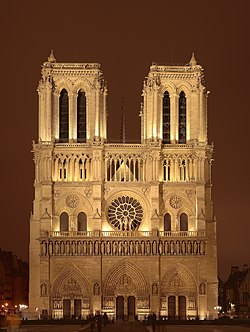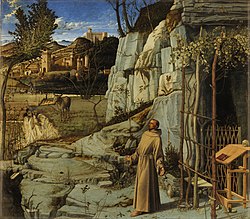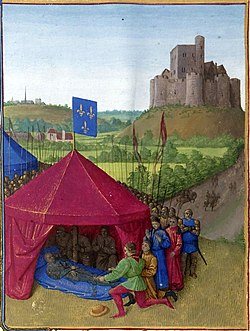Portal:Middle Ages/Selected picture
Selected picture
Usage
The layout design for these subpages is at Portal:Middle Ages/Selected picture/Layout.
- Add a new Selected picture to the next available subpage.
- Update "max=" to new total for its {{Random portal component}} on the main page.
Selected pictures list
Portal:Middle Ages/Selected picture/1
 |
The Lindisfarne Gospels is an illuminated Latin manuscript of the gospels of Matthew, Mark, Luke and John. The manuscript was produced on Lindisfarne in Northumbria in the late 7th century or early 8th century, and is generally regarded as the finest example of the kingdom's unique style of religious art, a style that combined Anglo-Saxon and Celtic themes, what is now called Hiberno-Saxon art, or Insular art.
Portal:Middle Ages/Selected picture/2
 |
Mont Saint-Michel and its abbey at night. This UNESCO World Heritage Site is a rocky tidal island roughly one kilometre from the north coast of Normandy, France at the mouth of the Couesnon River, near Avranches. Mont Saint-Michel was previously connected to the mainland via a thin natural land bridge, which before modernization was covered at high tide and revealed at low tide.
Portal:Middle Ages/Selected picture/3
 |
Notre Dame de Paris is a Gothic cathedral on the eastern half of the Île de la Cité in Paris, France, with its main entrance to the west. Construction began in 1163, during the reign of Louis VII, and opinion differs as to whether Maurice de Sully or Pope Alexander III laid the foundation stone of the cathedral. However, both were at the ceremony in question. Bishop de Sully went on to devote most of his life and wealth to the cathedral's construction.
Portal:Middle Ages/Selected picture/4
 |
The double-headed eagle is a common symbol in heraldry and vexillology. It is most commonly associated with the Byzantine Empire, the Holy Roman Empire, the Russian Empire and their successor states. Hans Burgkmair the elder was a German painter and woodcut printmaker.
Portal:Middle Ages/Selected picture/5
 |
Mont Saint Michel, a small rocky tidal island in Normandy, is famous for its Benedictine abbey (spire pictured here) and steepled church (built between the 11th and 16th centuries) which occupy most of the island.
Portal:Middle Ages/Selected picture/6
 |
The Ecstasy of St. Francis (or St. Francis in the Desert) is a painting by the Italian Renaissance master Bellini, who started this painting in 1475 and finished it around 1480.
Portal:Middle Ages/Selected picture/7
 |
The Song of Roland is the oldest major work of French literature. It exists in various different manuscript versions, which testify to its enormous and enduring popularity in the 12th to 14th centuries.
Portal:Middle Ages/Selected picture/8
Portal:Middle Ages/Selected picture/9
 |
A 13th century fresco of the Bulgarian Emperor Constantine Tikh and his wife Irina from the Boyana Church.
Portal:Middle Ages/Selected picture/10
 |
The Late Middle Ages is a term used by historians to describe European history in the period of the 14th and 15th centuries (AD 1300–1500). The Late Middle Ages were preceded by the High Middle Ages, and followed by the Early Modern era (Renaissance).
Nominations
Feel free to add related featured pictures to the above list. Other pictures may be nominated here.

